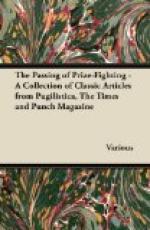* * * * *
=THE FIFTEEN TRIDGES.=
Once upon a time there was a flourishing covey of fifteen: Pa Tridge, Ma Tridge, and thirteen little Tridges, all brown and speckled and very chirpy. They had been born in a hollow under some big leaves beside a hedge, and they now moved about the earth, pushing their way through the grass, all keeping close together when they could, and setting up no end of a piping when they couldn’t and thought they were lost.
It was a large family from our point of view, and larger perhaps than a prudent French partridge would approve, but the world is wide, and there are no butcher’s or baker’s or tailor’s or dress-maker’s bills to pay for little birds. All that a Pa and Ma Tridge have to do after fledging is complete is to look out for cats and hawks and foxes, to beware of the feet of clumsy cattle, and to administer correction and advice. Above all there are no school bills, made so doubly ridiculous among ourselves by German measles and other epidemics during which no learning is imparted, but for which, educationalists being a wily crew, no rebate is offered.
There being so little to be done for their young, it is no wonder, in a didactic and over-articulate world, that parent Tridges take almost too kindly to sententiousness; and young Tridges, being so numerous as to constitute a public meeting in themselves, are specially liable to admonishment.
It was therefore that, strolling aimlessly amid the herbage or the young wheat with their audience all about them, Pa and Ma Tridge got into a habit of counsel which threatened to become so chronic that there was a danger of its dulling their sensibility to the approach of September the first.
“Never,” Pa Tridge would say, “criticise anyone or anything on hearsay. See for yourself and then make up your own mind; but don’t hurry to put it into words.”
“Tell the truth as often as possible,” Pa Tridge would say. “It is not only better citizenship to do so, but it makes things easier for yourself in the long run.”
“Always bear in mind,” Ma Tridge would say, “that after one has married one’s cook she ceases to cook.”
“Never tell anyone,” Pa Tridge would say, “who it was you saw in the spinney with Mr. Jay or Mrs. Woodpecker.”
“Indeed,” he would add, “you might make a note that the world would not come to a miserable end if everyone was born dumb”—but he was very glad not to be dumb himself.
“Even though you should get on intimate terms with a pheasant,” Ma Tridge would say, “don’t brag about it.”
“Forgive, but don’t forget,” Pa Tridge would say.
“Remember,” Pa Tridge would say, “that, though it may be wiser to say No, most of the fun and all the adventure of the world have come from saying Yes.”
“Bear in mind,” Ma Tridge would say—but that is more than enough of the tiresome old bores.




